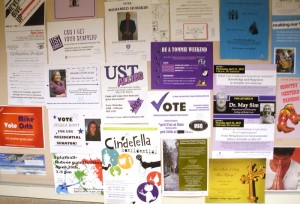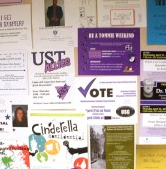
With Undergraduate Student Government elections underway, this year’s candidates are finding out something many students already know: It is hard to win votes when people don’t even know what you do.
“Unfortunately, I can’t say that I know all too much about the USG elections,” sophomore Aly Kelly said. “I am only somewhat familiar with them because two of my friends are running for junior class president.”
Words like Kelly’s serve as motivation for USG executive board presidential candidate Liz Motz. She’s gaining students’ attention with a Facebook group.
“The biggest thing you can do is make a Facebook group,” Motz said. “It’s kind of weird how much a Facebook group can do.”
“Vote Liz Motz for USG President” has more than 250 confirmed attendees, but Motz said she will continue to do whatever it takes to make USG a more visible organization for students. She plans to go door-to-door to inform people about the election and urge them to vote. In Motz’s opinion, getting the student body actively voting is by far the biggest issue any candidates face.
“I don’t think everyone realizes how easy it is to just log on [and vote],” she said.
Voting opened at 9 a.m. Thursday and runs until noon Saturday, April 24. There are 21 seats open for election, five of which are on the organization’s executive board. The only executive position to attract multiple candidates is executive board president.
Junior class presidential candidates Jazz Hampton and Njenga Kariuki are trying to solve that problem with their campaign strategy, too.
On a Facebook page dedicated to getting students active in the voting process, the candidates state that their goal is for this year’s election is for the junior class to account for the highest participation percentage of all voters. They also stress that being active in the voting process is the best way to make St. Thomas a tight-knit community.
Dwight Anderson, the other candidate for executive board president, feels the lack of voter action comes from misperception between USG and the community it serves.
“People don’t know the scope of USG’s activities,” Anderson said. “If I ask [students] ‘What is USG doing? What are the current issues at hand?’ they wouldn’t know.”
Anderson said the feeling among the people he’s talked to is that when it comes to voting, the Tommie Award takes precedence over USG elections. It’s that sort of apathy that irks Anderson.
“This is a huge position on campus; there should be more than two people running,” Anderson said. “People are just unaware. That’s just what it is. It’s frustrating, but it’s just something USG has to be better about.”
For now, all candidates can do is hope that by marketing themselves, they’re also marketing USG and the things it stands for.
Kelly, while optimistic for her student government’s future, knows that USG still has a ways to go in proving its relevance to students.
“I think USG is, and can be, an important part of our campus, but I don’t think very many people are well informed about it, and therefore it is not important to a majority of people on campus,” Kelly said.
Motz just hopes that students gain an appreciation for USG sooner rather than later.
“It’s not that we’re not doing things,” she said. “It’s that the things we do aren’t necessarily big and bold and splashy. If USG wasn’t there, people would notice right away.”
Ben Katzner can be reached at bekatzner@stthomas.edu.

